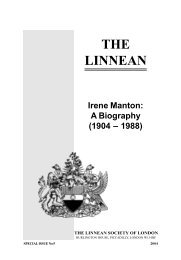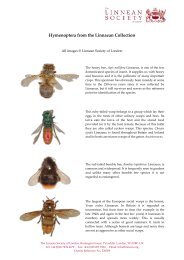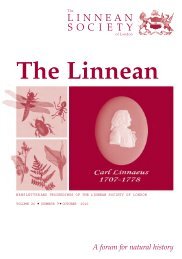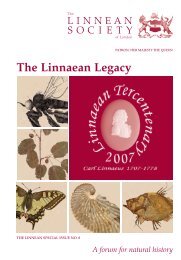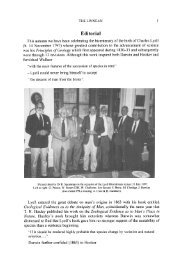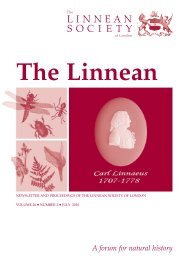Vol 25, no 3, October - The Linnean Society of London
Vol 25, no 3, October - The Linnean Society of London
Vol 25, no 3, October - The Linnean Society of London
You also want an ePaper? Increase the reach of your titles
YUMPU automatically turns print PDFs into web optimized ePapers that Google loves.
24<br />
THE LINNEAN 2009 VOLUME <strong>25</strong>(3)<br />
though it may be necessary <strong>no</strong>w, in the context <strong>of</strong> neo- or post-Darwinism, to understand<br />
that biological evolution can continue in interwoven relationship with the cultural<br />
and historical development <strong>of</strong> humanity, generally Darwinism has in the past failed,<br />
and still does fail <strong>no</strong>w, to distinguish between the two processes. From Darwin himself<br />
to Herbert Spencer, through to many Darwinian biologists who today attempt analyses<br />
<strong>of</strong> human history and society, the confusions are deep, and persist, as many writers<br />
have attempted to show. Darwin’s ‘swerving’, his ‘disturbance’(to use Beer’s words),<br />
in his meditations on the Fuegians, and their imagined similarity or difference from<br />
animals, is conducted in a confused, moralistic, and derogatory mode <strong>of</strong> thinking<br />
which is as common today as it was in Darwin’s own. It absolutely fails to see that<br />
different human societies have different cultures, different behaviours and different<br />
ethical systems and attitudes: conditioned greatly by natural and environmental factors<br />
and processes, in ways that are extremely complex, but again, <strong>no</strong>t in ways that mirror<br />
the environmental determinism <strong>of</strong> other animals’ physiology or behaviour.<br />
Human societies can only be judged one against a<strong>no</strong>ther according to the taste <strong>of</strong><br />
he or she who judges or according to ethical principles which should be made absolutely<br />
explicit in the course <strong>of</strong> making such judgements, and according to which certain<br />
Western cultures, vis-a-vis the morality <strong>of</strong> killing other human beings for example,<br />
would rank very low in any pan-human table <strong>of</strong> ethical comparison. Human beings<br />
are animals, yes, but as members <strong>of</strong> one animal species, Homo sapiens. Yet it is<br />
remarkable how <strong>of</strong>ten European or Neo-European individuals and nations that want<br />
to justify and rationalize their nastiest kinds <strong>of</strong> behaviour (ethically speaking), draw<br />
upon the fact that human beings are, after all animals.<br />
Major differences between human beings are either individual, or culturally based;<br />
though it is true that the roles <strong>of</strong> biology and genetics in understanding these differences<br />
are only just beginning to be understood.<br />
A NOTE ON H.W. BATES<br />
Two quotations from H.W. Bates’ science-cum-travelogue book <strong>The</strong> Naturalist<br />
On <strong>The</strong> River Amazons may suffice to indicate some <strong>of</strong> the differences between Bates’<br />
and Darwin’s approaches to the human dimensions <strong>of</strong> their experiences in South<br />
America. Bates certainly has some stereotypical European prejudices, and his<br />
perceptions are <strong>of</strong>ten constructed through characteristic nineteenth-century tropes,<br />
themes, vistas, and metaphors belonging to a British colonial view <strong>of</strong> ‘tropicality’,<br />
with his readership at home always in mind. But, like Alfred Russel Wallace, who<br />
also displayed “a somewhat baffling mixture <strong>of</strong> the conventional and the unconventional<br />
........ (in an attitude <strong>of</strong>) unsettled ambivalence” (as explained in Nancy Stepan’s book<br />
Picturing Tropical Nature), Bates has at the same time a spontaneous sympathy and<br />
empathy with people, and a more admiring attitude towards the people he meets, than<br />
Darwin evinces:<br />
(I) “On the morning <strong>of</strong> the 28th <strong>of</strong> May we arrived at our destination (Belém de Pará).<br />
<strong>The</strong> appearance <strong>of</strong> the city at sunrise was pleasing in the highest degree. It is built on a<br />
low tract <strong>of</strong> land, having only one small rocky elevation at its southern extremity; it<br />
therefore affords <strong>no</strong> amphitheatral view from the river; but the white buildings ro<strong>of</strong>ed<br />
with red tiles, the numerous towers and cupolas <strong>of</strong> churches and convents, the crowds <strong>of</strong>



